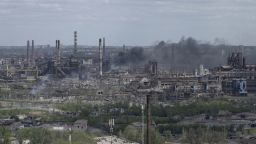Mykola Kulichenko struggles to recount a tale he shouldn’t be alive to tell. But this Ukrainian man believes he was allowed to cheat death so he might speak for all those who cannot.
By the side of a remote road in the northern Chernihiv region of Ukraine, Mykola shows the unmarked grave in which he and his two brothers were buried three-and-a-half weeks after the war began, in land seized by Russian forces. All three had been shot; he was the only one to survive.
“It’s like being resurrected,” Mykola, 33, told CNN.

Until March 18, life for the Kulichenko family had changed little despite the Russians occupying their village of Dovzhyk since the start of the war. Then, when a Russian column was bombed, Russian soldiers fanned out looking for those responsible. They arrived at the wood-plank house where Mykola lived with his two brothers, Yevhen and Dmytro along with their sister, Iryna – who still hasn’t forgiven herself for not being home that day.
Three soldiers told the brothers to kneel in the front yard while they searched the home looking for anything that would link them to the bombed convoy, Mykola said. According to Mykola, once they found the military medals their grandfather owned and a military bag belonging to 30-year-old Yevhen, who had been a paratrooper, the soldiers were convinced they had something to hide.
Mykola, Yevhen and Dmytro were driven to a basement where they were interrogated for three days, he said. Mykola kept hoping the Russians would release them, but on the fourth day, he said, their mood changed.
“They beat my whole body with a metal rod, and they put the barrel of a gun inside my mouth,” he said.
Along with his brothers, Mykola was tortured until he lost consciousness. He says they were blindfolded, had their hands and legs bound with tape and were driven in a military vehicle by five Russian soldiers to a desolate plot of land. They were made to kneel, blindfolded, while a pit was dug, Mykola said.
First, he said, he heard a shot behind him, and 36-year-old Dmytro, the eldest of the three, fell to the ground. Next, he felt Yevhen, the youngest, drop by his side.
“I was thinking that I was next,” he said. But the bullet entered Mykola’s cheek and exited next to his right ear. He knew his only hope of survival was to play dead.
The soldiers kicked the brothers’ bodies into the pit, covered them with earth and left, according to Mykola. He can’t say how long he lay buried alive, only that with his hands and legs still bound he somehow managed to maneuver his way out from under his older brother’s corpse and back to the land of the living.
“It was hard for me to breathe, since Dima (Dmytro) was lying on top of me, but using my arms and knees, I was able to push my older brother off to the side of the pit, and then I climbed out.”
In the dark, he staggered through fields to the nearest house, where a woman took him in and cared for him overnight before he was able to get back to his sister, who’d been anxiously waiting for days at their father’s home.
“I came home and there was Mykola. I looked at his eyes and asked where are the others? He said there are no others,” Iryna recalls, sobbing.
Mykola says it’s a miracle he survived. Scars on his cheek and behind his ear are still visible today.
“I was lucky… and now I have to just go on living,” he said. “This story needs to be heard by everyone, not just in Ukraine, but around the world because these kind of things are happening and this is just one in a billion.”
A war crimes investigation has now been opened by the Chernihiv region prosecutor’s office. Investigators confirmed to CNN that the brothers’ hands and legs had been tied and they had been blindfolded. Across Ukraine, more than 11,600 alleged war crimes have been recorded so far, according to local authorities. CNN also reached out to Russia’s Ministry of Defense but got no response.
As with so many of the other alleged war crimes committed by Russian forces, the story of Mykola and his brothers could only be told once the Russian retreat from Chernihiv region began in early April.
It was also only then that Mykola could start looking for the pit from which he had, against all odds, escaped with his life. He knew he had to find his brothers in order to give them the decent burial they deserved.
On April 21, one month to the day after Mykola says his brothers were executed, Dmytro and Yevhen were finally laid to rest beneath elaborate tombstones in a well-tended grave, in land that was in Ukrainian hands once more.

